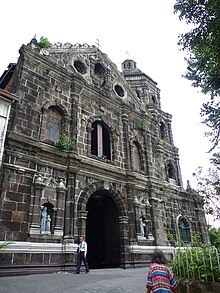Santa Ana Church
| Santa Ana Church | |
|---|---|
| Our Lady of the Abandoned Parish Church of Santa Ana Parroquia de Nuestra Señora de los Desamparados Iglesia de Santa Ana |
|

Facade of the Santa Ana Church
|
|
| 14°34′55″N 121°00′50″E / 14.581953°N 121.013764°ECoordinates: 14°34′55″N 121°00′50″E / 14.581953°N 121.013764°E | |
| Location | New Panaderos Street, Santa Ana, Manila |
| Country | Philippines |
| Denomination | Roman Catholic |
| History | |
| Founded | 1720 |
| Founder(s) | Fr. Vicente Inglés, O.F.M. |
| Dedication | Our Lady of the Abandoned (Nuestra Señora de los Desamparados) |
| Architecture | |
| Status | Parish church |
| Functional status | Active |
| Heritage designation | Level II Historic Building - with marker (NHCP) |
| Designated | 1936 |
| Architectural type | Church Building |
| Style | Baroque |
| Groundbreaking | September 12, 1720 |
| Completed | 1725 |
| Construction cost | ₱ 33,000 |
| Specifications | |
| Materials | Adobe blocks |
| Administration | |
| Archdiocese | Manila |
| Province | Manila |
| Clergy | |
| Archbishop | Luis Antonio Cardinal Tagle, DD, S.Th.D |
| Rector | Rev. Fr. Esmeraldo T. Enalpe, OFM |
The Santa Ana Church, also known as the Parish of Our Lady of the Abandoned (Spanish: Parroquia de Nuestra Señora de los Desamparados), is a Spanish colonial period church located in the district of Santa Ana in Manila, Philippines. The parish was established by the Franciscan missionaries in 1578 under the patronage of Saint Anne. The present stone church was constructed by Father Vicente Inglés, OFM from 1720 to 1725 and was dedicated to its present patron, the Our Lady of the Abandoned. The revered image of its patron was made in Valencia,Spain in 1713 and arrived in the Philippines in 1717.
The church houses two National Cultural Treasures declared by the National Museum of the Philippines; the Santa Ana Site Museum located in the convent patio and the Camarín de la Virgen (or the Dressing Room of the Virgin).
The town of Santa Ana was first established by the Spanish Franciscan missionaries in 1578, in a settlement beside a creek connecting to the Pasig River, which the local inhabitants referred to as Sâpa. Its first church, dedicated to their titular patroness Saint Anne, was made of nipa and bamboo until a decree from the Colonial Government in 1599 permitted the religious order to build the church in stone. However, the construction came only around 1720 upon the direction of then parish priest of Santa Ana Fr. Vicente Inglés, OFM wherein a new site was chosen, which is the current location of the structure. Dedicated to Our Lady of the Abandoned (Nuestra Señora de los Desamparados), the building of the stone church began in September 12, 1720 with the laying of the cornerstone by Governor General and Archbishop of Manila Francisco de la Cuesta, OSA. The construction took five years to finish, with the total cost of ₱ 33,000 including the donation of the Governor General amounting to four thousand pesos.
...
Wikipedia

